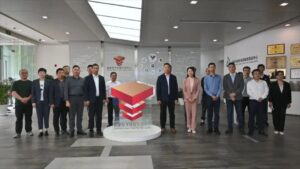Mr. Xie Jihua, General Manager of Yangpu Science and Technology Entrepreneurship Center: Make yourself a good entrepreneur first!




Reporter Mao Xinhui Zhu Liangcheng
"In him, there is a valuable entrepreneurial spirit, the ability to see business opportunities and take risks, the courage to take charge, the ability to plan, and the willingness to constantly challenge new business models." Fan Weijun, editor-in-chief of China Incubator magazine, said of Xie Jihua.
Incubators were first introduced to China in 1987, and as an industry observer, Mr. Fan has witnessed the ups and downs of China's incubator industry over the past 28 years. In his eyes, Xie Jihua, General Manager of Shanghai Yangpu Science and Technology Entrepreneurship Center (Yangchuang), is one of the most iconic figures in the industry.
It started from a 6,000-square-meter old factory building in a candy factory. Today, Yangchuang operates an area of nearly 1 million square meters, with total assets of nearly 3 billion yuan.
In the field of incubators, Yangchuang has become synonymous with "innovation". Every innovation of Yangchuang leads the development direction of the industry. The first microfinance company with an incubator as the main sponsor; the first business incubator in China with loan and investment functions; the establishment of an innovative service system with "business nursery - incubator - accelerator" as the core... ...
Early practitioners of the "tri-zonal linkage"
In the "butterfly effect", a butterfly flapping its wings can cause a tornado, and Yangchuang is the butterfly fluttering its wings.
In 1997, a small road next to Fudan University gave birth to the first domestic incubator established near the university - Shanghai Yangpu Hi-Tech Entrepreneurial Service Center. This incubator is the predecessor of Yangchuang. The original intention of the park was to learn from successful foreign experience and rely on the innovation advantages of universities to cultivate and serve entrepreneurial enterprises.
The incubator began as a traditional institution, the landlord of a 6,000-square-meter old factory building, barely making ends meet with rental income.
Both Shanghai and Yangpu hope the business service center will grow bigger, but it didn't develop well a few years ago. At that time, the state proposed to build a university science and technology park, Fudan University is ready to build its own science and technology park, some people worry that the incubator is marginalized. The most troublesome thing is that the new science and technology park, the expansion of the incubator need funds, both urban areas are said to be shy. In a dilemma, Yangpu District asked Xie Jihua, who was the general manager of a subsidiary of Shanghai Science and Technology Investment Corporation, to help with the idea.
The entrepreneurial service center is an institution, and Xie Jihua believes there is a contradiction between the mechanism of an institution and the functional positioning of an incubator. "Institutions drought and flood, overly dependent on financial allocations, will not be forced by the market to improve service quality and explore business models. Earlier incubators are more like landlords and can provide limited services to park enterprises."
Xie Jihua strongly advocated institutional mechanism reform, proposed the establishment of "two teams, two sets of systems" in the entrepreneurial service center, the incubator's operation and ownership of the separation, the former belongs to the market-oriented operation of the company (incubator base company), the latter belongs to the non-profit institutions (entrepreneurial service center).
However, the funding issue still hangs in the balance. "In the late 1990s Yangpu's traditional industrial industries went downhill, and industrial restructuring was on the agenda. Yangpu wants the intellectual resources of the Centennial University to radiate the whole region, to the direction of the 'knowledge city' transformation. In this context, incubators that undertake the task of industrializing research results can be the medium to break the boundaries between universities and communities. This campus and community interaction should first be reflected in the incubator's shareholding structure." Based on this judgment, Xie Jihua decided to work to facilitate a three-way partnership between the Shanghai Science and Technology Commission, Yangpu District, and Fudan University, using capital ties to make all three parties shareholders of the incubation base company.
Eventually, Xie Jihua's idea became a reality, and the government and the school formed a close relationship through equity. 2001, the Shanghai Hi-Tech Enterprise Yangpu Incubator Co.
The linkage of university campuses, science parks, and public communities later became an important path for Yangpu's transformation, and the incubator was an early practitioner of the "three districts linkage" idea.
"Being an incubator is a service to innovation."
Entrepreneurship is a path full of thorns for college students, and enthusiasm alone is not enough. However, if you have a good idea, you can move into Yangchuang's business nursery with your own bag. It not only provides a zero-cost environment for college students to start their own business, but also provides a complete incubation service system to let the seeds of innovation take root and grow vigorously. The innovation service system of "business nursery-chemistry-accelerator" established by Yangchuang provides professional services for different stages of business ventures, explores an effective way for the transformation of university scientific and technological achievements, taps and cultivates a group of university entrepreneurial elites, and improves the competitiveness of the company. The rate of successful entrepreneurship among university students has increased.
Shanghai Fuzhan Intelligent Technology Co., Ltd. is now a clear development plan of the Three New Board listed enterprises, but at the beginning of the founding, the founder of the enterprise Sun Hongtao is mistaken to do everything. He has opened a shop, ran a comic book bar, did auto parts, at the time, think "can support themselves, can make money on good". Like many newly graduated college students, entrepreneurship is just a whim of Sun Hongtao. "When I graduated I didn't think too much about it, I just felt that if I could do it, I would go back to looking for work."
In the early stage of business, Sun Hongtao stumbled and had trouble constantly. His business mentor Xie Jihua is like "mother's family", accompanying Sun Hongtao all the way through the ups and downs. And team other founders disagreement, and girlfriend quarrel, in addition to enterprise business confusion, life troubles Sun Hongtao also like to go to Xie Jihua confide. "Xie is like a kind elder, no matter how late it is, he is willing to come to understand and care about the trivial matters of us entrepreneurs and share his experience with us."
In Yangchuang, Xie Jihua is not the only entrepreneurial mentor. They come from different industries and provide free advice to entrepreneurs and participate in mentoring services as mentors.
In addition to business mentors, there are two other important roles in the Yangpu Science and Technology Entrepreneurship Center's business mentor system - liaison and mentor. The liaison officer rotates regularly and serves as a bridge between the company and the incubator, pairing the expertise of the business mentor with the company's strategic development goals. The dialogue, communication and exchange between the business liaison and the business mentor helps to cultivate the liaison's awareness of empathy, boldness and innovation, and the courage to develop practices.
Mentors, on the other hand, are experts in human resources, finance, management and law. After the liaison provides sufficient information about the company and its needs, the individual or team of mentors will follow up with the company on a long-term, individual basis and provide advice on specific matters in the development of the company.
"Not knowing how to be satisfied, not willing to fall behind, not willing to be mediocre" are the words that appear most frequently when colleagues and friends around commenting on Xie Jihua. Xie Jihua often says to his team, "We are an incubator to serve innovation, it's hard to imagine a team that follows the old ways to serve innovation, so we need to make ourselves a good entrepreneur first."
For a long time, a crude "consensus" existed among domestic incubator operators: incubators accepted businesses into their facilities and charged them for the basic services they provided. In other words, the business as a customer. "Isn't it precisely because of a lack of capacity that small businesses turn to incubators for help?"
Xie Jihua proposed another way of thinking: the incubator's customers should be the government. The incubator to accept the government to buy services, free of charge for the resident enterprises to provide services, and the service content to be in the "food, drink, laxative" level to upgrade. Xie Jihua's theory is now widely accepted by the domestic incubation industry, but at the time, it had yet to be tested by newly established incubation base companies.
In 2010, the successful IPO of one of Yang Chuang's companies, Warburg Pincus, which had been nurtured from seedlings, inspired Xie Jihua. "Can we help more companies to follow the path of Warburg Pincus? How do you help graduate startups accelerate their growth?" In Xie Jihua's entrepreneurial journey, there are countless thoughts like this one. "I'd rather retire if I can't innovate one day." He said.
Summarizing the successful experience of Yangchuang, Fan Weijun believes that it is inseparable from the entrepreneurial spirit in Xie Jihua's bones. Yang Chuang can be at the forefront of national incubators thanks to the continuous reform of the institutional mechanism. "Many people know the importance of reforming the institutional mechanism, but when it comes to putting it into action, the first consideration is often the impact of the reform on personal interests," said Fan Weijun, "but Xie Jihua's first consideration is the market demand, how to find an advanced and market-oriented mechanism to lead the This institution continues to innovate, stay dynamic and keep up with the times."




